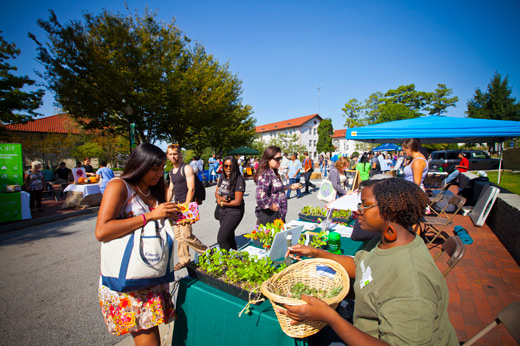Taste the flavors of summer at the next Emory Farmers Market. It's peak season for fuzzy, fresh Georgia peaches, and prime time for refreshing watermelon. Both star in the "Favorite Flavors of Summer," a special farmers market event on July 23, featuring a watermelon seed-spitting contest and an opportunity to sample the wares of more than 20 vendors.
"The Emory Farmers Market has become a gathering place for the campus community to shop, talk and have lunch," says Julie Shaffer, sustainability projects manager for Emory's Food Service Administration.
Shaffer, who is also the founder of Slow Food Atlanta, shares the following tips for making the most of any farmers market:
Bring your own bag or baskets. An easy way to be sustainable. If you don’t have a place to keep your purchases cool in summer, consider bringing a small cooler.
Bring cash. While more and more vendors have a mobile app like "Square" to be able to accept charge purchases, many still do not.
Know what’s in season. Foods grown locally and picked in peak season are much tastier than foods that travel 1,500 miles (average distance for supermarket produce) from the field to your plate. Plus, eating what’s in season contributes to a strong “sense of place.” If you have ever eaten a Georgia peach picked that same day, or a summer tomato right off the vine, it’s difficult to go back to the mealy, tasteless tomatoes of winter. See the Georgia Organics Harvest Calendar.
Ask questions. Farmers can offer helpful tips for preparation of the foods they sell, as well as interesting stories about how the foods are grown. Cultivating a personal relationship with your food grower/producer can be enriching and rewarding for both the producer and consumer. It’s nice knowing that your farmer has a name, and that your food dollars are helping her pay the mortgage, or helping him put his child through college.
Try new things. Many farmer vendors offer heirloom varieties of produce, most of which have disappeared from the grocery stores with the industrialization of food. Rainbow carrots, watermelon radishes, Cherokee Purple tomatoes, Romanesco cauliflower, and many other old varieties may be available and are delicious. Buying them also is an investment in the genetic biodiversity of our foodshed.
It's okay to pick produce that looks less than perfect. USDA Organic and Certified Sustainable foods are often not as perfect-looking as foods that are grown industrially. Don’t be afraid of a spot on your apple, or a dent on your peach. Perfect is not always the tastiest – and you may get a discount.
Find more than produce. Emory Farmers Market vendors sell honey, eggs, breads, pastries, jellies, jams, grass-fed beef and more, all produced locally. Supporting these small, local business strengthens the local economy. When shopping for food, remember to keep your state on your plate!
Become an informed, conscious and conscientious consumer of food. Familiarize yourself with marketing identifiers such as USDA Organic, Cage Free, Animal Welfare Approved, and Fair Trade. Know where your food comes from, how it was produced, and how the people who produced it were treated.
This fall will mark the return of weekly farmers markets, with new expanded hours from 11 a.m. to 3 p.m. The Emory Farmers Market is held on the Cox Hall Bridge.

